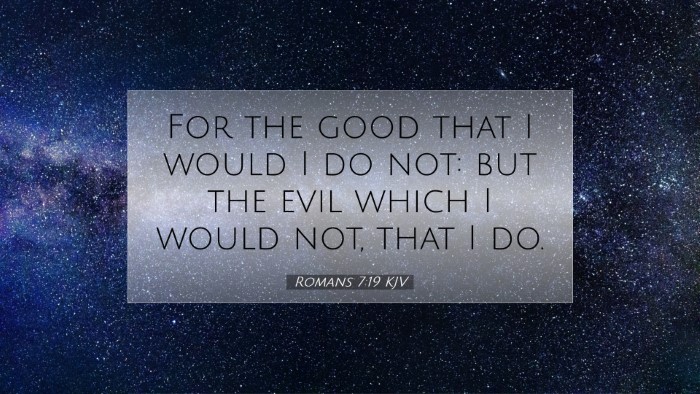Old Testament
Genesis Exodus Leviticus Numbers Deuteronomy Joshua Judges Ruth 1 Samuel 2 Samuel 1 Kings 2 Kings 1 Chronicles 2 Chronicles Ezra Nehemiah Esther Job Psalms Proverbs Ecclesiastes Song of Solomon Isaiah Jeremiah Lamentations Ezekiel Daniel Hosea Joel Amos Obadiah Jonah Micah Nahum Habakkuk Zephaniah Haggai Zechariah MalachiRomans 7:19
Romans 7:19 KJV
For the good that I would I do not: but the evil which I would not, that I do.
Romans 7:19 Bible Commentary
Commentary on Romans 7:19
Verse: "For the good that I would I do not: but the evil which I would not, that I do."
Overview
This verse encapsulates the struggle between the desires of the spirit and the inclinations of the flesh, portraying a profound inner conflict. The Apostle Paul, in his letter to the Romans, highlights the paradox of human experience in the pursuit of righteousness versus the persistence of sin.
Insights from Matthew Henry
Matthew Henry emphasizes the discrepancy between intention and action. He observes that the moral struggle you experience is universal. Henry notes that what one truly wishes to achieve in righteousness often falls short due to the corruption of human nature:
- Inner Conflict: Henry identifies the tension between the will to do good and the inability to accomplish it. This indicates a deeper struggle within the believer.
- Nature of Sin: He points out that sin operates not merely externally but also internally, leading to despair in the face of one's moral failures.
- Need for Grace: His commentary stresses the necessity of divine grace to overcome this internal conflict.
Albert Barnes' Perspective
Albert Barnes provides a concise examination of the implications of Romans 7:19. He argues that:
- Human Limitation: Barnes underscores that Paul, even as an apostle, recognized this struggle, illustrating that it is a common plight even among the faithful.
- Conditional Goodness: He explicates the idea that the good which one wishes to perform is thwarted by a fallen nature, emphasizing the necessity for the Holy Spirit to enable obedience.
- The Role of the Law: Barnes also relates this struggle to the Law, indicating that while the Law is good, it exposes sin and makes believers aware of their moral inadequacies.
Adam Clarke's Interpretation
Adam Clarke offers a theological expansion on this verse, addressing the concept of dual nature within believers:
- Conflict of Wills: Clarke stresses that believers possess two opposing wills: one seeking to align with God’s desires and the other prone to sinful inclinations.
- Spiritual Warfare: He speaks of this as a spiritual warfare that necessitates vigilance and reliance upon God.
- Progressive Sanctification: Clarke points to growth in the Christian life, suggesting that while believers will struggle, their journey towards sanctification requires perseverance and reliance on God's grace.
Theological Implications
Romans 7:19 serves as a reminder of the ongoing struggle against sin that every believer endures. The thought processes presented by Henry, Barnes, and Clarke encourage a deeper understanding of:
- The Total Depravity of Man: This verse underscores the Reformed view on total depravity, which suggests that sin affects every part of a person—mind, will, and body.
- The Necessity of the Holy Spirit: Emphasizing that true transformation and victory over sin come through the power of the Holy Spirit, making reliance on Him essential for a victorious Christian life.
- The Importance of Community: Pastors and teachers are reminded that teaching must address this struggle, offering support and encouragement within the Christian community to combat feelings of isolation.
Application for Believers
In light of Romans 7:19, believers are called to:
- Recognize Their Weakness: Acknowledging their own limitations can lead to a deeper dependence on God’s grace.
- Engage in Prayer: Consistent, earnest prayer can help believers align their wills with God's.
- Seek Accountability: Sharing struggles with trusted fellow believers can provide encouragement and support in the journey of faith.
Conclusion
Romans 7:19 reveals the timeless human struggle with sin and the profound need for divine support. The insights from Matthew Henry, Albert Barnes, and Adam Clarke collectively highlight the theological significance of this inner turmoil. For pastors, students, theologians, and scholars, this verse serves as a pivotal point for understanding human nature, the workings of grace, and the path toward sanctification.


